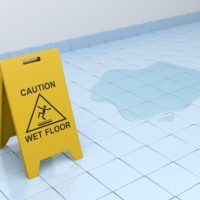9 Questions About Slip and Fall Accident Law

Slip and fall accidents can disable anyone at anytime, leading to staggering medical bills, lost productivity and other damages. These accidents are surprisingly diverse; they occur in public areas, people’s homes and properties, and on the job. Here is a list of nine of the most frequently asked questions about slip and fall accidents, injuries, claims and litigation.
Slip and Fall Attorney – Nine FAQs
- What do I do after a slip and fall accident? Get medical help. If you can, photograph the area where the slip or fall happened, and also document any injuries to yourself. Collect witness statements as well as a copy of the police report, if you file one.
- Who is responsible for my injury? Every case is different. If you fell because your shoelace was untied, in general, that is your fault. However, if you slip on your shoelace in a dark parking lot that should have had security lights, the property owner may be at fault.
- What is negligence? Negligence is when someone owes a duty of care to another or to the public and fails to act. If a grocery store customer slips on a puddle in the drink aisle and suffers a fractured hip as a result, the business may be found negligent for failing to clean up the spill.
- What is comparative negligence? Comparative negligence is when the plaintiff is partially at fault for his or her injuries. For instance, you may be partly responsible for your fall if you did not tie your shoes. However, if you fell in a dim parking lot that should have been lighted, or if an unusual dip in the pavement caused the fall, the property owner could also be partially at fault and could be liable to pay a portion of your damages.
- Under what circumstances can I sue a city or government for a slip and fall incident? For instance, let’s say you trip on a loose stone on a sidewalk outside a city metro station. Could the government be liable for the resulting injuries? The answer depends sensitively on state laws. A California personal injury attorney can evaluate your situation and help you strategize. Be advised that the statute of limitations (the “time limit” you have to bring a legal claim) may be much tighter, so don’t delay getting insight from a qualified attorney.
- Can I sue a homeowner if my injury occurs on his or her property? Again, it depends on the situation. If a homeowner knew there was a risk and neglected to inform an expected visitor, he or she may be liable. The homeowner’s insurer would likely be responsible to pay your claim.
- Who is liable if my injury occurs on a business’ property? Diverse parties could be responsible. For instance, let’s say a shopping complex leases space to a hardware store. At the store, while picking up nails and a hammer for a home improvement project, you trip on a demo floorboard and break your knee in a painful fall. The hardware store (and its insurer) could be held responsible. But what if the lessor also knew about the dangerous conditions and neglected to compel the hardware store owner to clean up or label the hazard? Potentially, she could also be held liable for what happened.
- How long do I have to file a suit for a slip and fall claim? In California, in general, you have two years from the day of the injury to file a claim. In a fatal slip and fall, family members have three years from the injured party’s death to file a claim.
- Do I need an attorney? Understanding who is responsible for your injury and proving liability can be complicated. An experienced attorney can explain your options and devise a strategy. Our legal team can provide a confidential free consultation. Please call or email us for more information.
